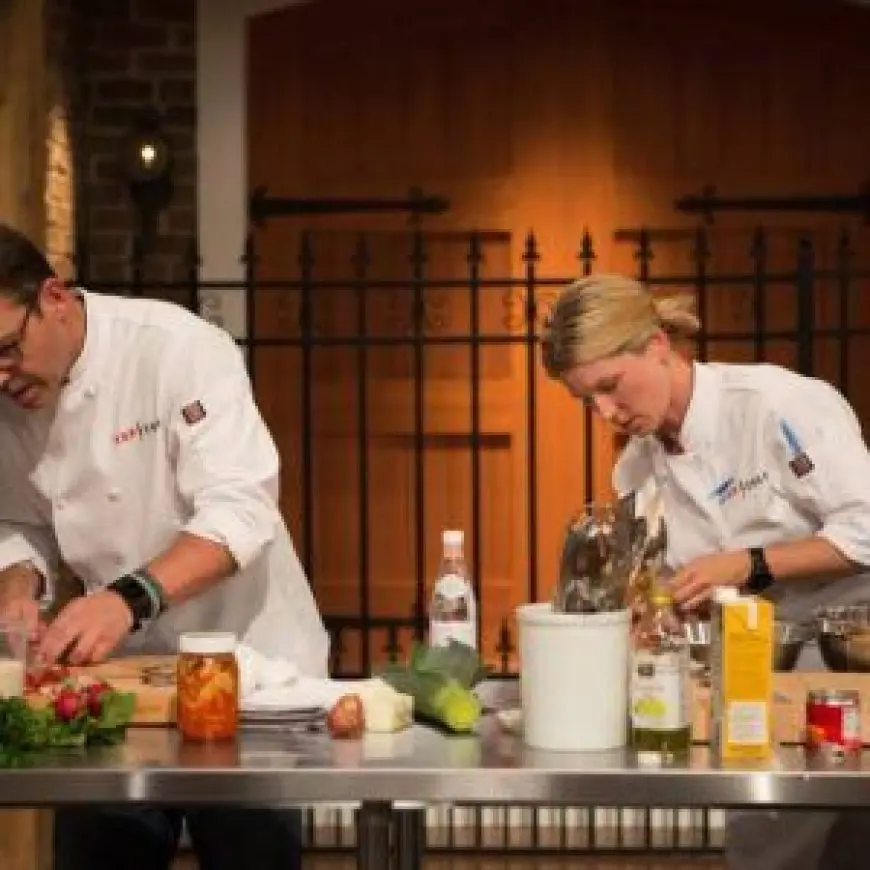Why Cooking Shows Are So Addictive
Why Cooking Shows Are So Addictive

Cooking shows have become an undeniable phenomenon in the entertainment world, captivating millions of viewers worldwide. Whether it's the drama of competitive cooking, the soothing process of meal preparation, or the tantalizing food that’s featured on screen, these shows have found a special place in many people's hearts and homes. But what makes cooking shows so addictive? The reasons are multi-faceted, from the emotional appeal to the creativity and inspiration they offer.
A Visual Feast for the Senses
One of the key reasons cooking shows are so captivating is the sheer visual appeal. Food, with its vibrant colors, textures, and intricate details, naturally attracts the eye. The process of watching raw ingredients transform into delicious dishes offers a sensory journey for the viewer. The sizzling of food in a pan, the vibrant chopping of vegetables, and the final beautifully plated dish all create a multisensory experience that is both satisfying and mouthwatering. The close-up shots of food are designed to tantalize the senses and spark an emotional response, making it hard to look away.
The Allure of Learning and Inspiration
Cooking shows provide a wealth of information, allowing viewers to learn new recipes, cooking techniques, and kitchen tips. For many, they serve as an accessible way to improve their culinary skills without stepping foot in a professional kitchen. The allure of acquiring knowledge, especially when it comes to preparing delicious meals, creates a sense of accomplishment. Viewers are drawn to the idea of becoming better home cooks, trying new recipes, and impressing their friends and family with their newfound abilities.
Beyond technical skills, cooking shows inspire creativity. Watching chefs create unique and beautiful dishes can ignite the viewer’s imagination, sparking ideas for their own culinary adventures. The challenge of experimenting with flavors, textures, and presentation makes cooking more than just a chore; it becomes an enjoyable form of self-expression. These shows encourage people to explore the world of food, experimenting with different cuisines and cooking styles.
The Drama and Suspense
In many cooking shows, particularly competitive ones like "MasterChef" or "Chopped," the element of drama plays a major role in keeping audiences hooked. The high-stakes environment, where contestants battle under pressure and race against the clock, creates a sense of tension and excitement. The unpredictable nature of these competitions—where one mistake could send someone home—adds a layer of suspense. This dramatic tension keeps viewers on the edge of their seats, eagerly awaiting the next twist in the storyline.
The competitive element also taps into human nature, offering viewers the opportunity to root for their favorite contestants. People enjoy seeing individuals rise to challenges, overcome obstacles, and succeed or fail in the kitchen. The mix of talent, ambition, and the stakes involved makes cooking shows as thrilling as any sports event or reality competition.
The Comfort and Nostalgia Factor
For many, cooking shows evoke a sense of comfort and nostalgia. There is something inherently soothing about watching food being prepared, especially when it’s done slowly and with care. Cooking shows often portray cooking as an enjoyable, therapeutic activity—a welcome break from the hustle and bustle of daily life. This sense of relaxation is part of the appeal, offering viewers an escape into a world where food is lovingly prepared, and every step is a deliberate act of care and creativity.
Additionally, food is closely tied to memories and emotions, often evoking strong nostalgic feelings. Cooking shows tap into these sentiments by showcasing traditional dishes, family recipes, and cultural cuisine that remind viewers of home or special moments. The act of cooking can serve as a means of connection to one's past, and watching others prepare these dishes can be a way of reliving those cherished memories.
The Charismatic Hosts and Chefs
The personalities of the chefs and hosts also play a huge role in the popularity of cooking shows. Charismatic and entertaining personalities can transform what might otherwise be a simple recipe demonstration into a captivating experience. Celebrities like Gordon Ramsay, Julia Child, and Nigella Lawson have become household names not only because of their culinary expertise but also because of their engaging, often larger-than-life personalities. Whether they bring humor, warmth, or authoritative expertise to the table, these chefs connect with viewers on a personal level, making their shows feel like an intimate experience.
Audiences also enjoy the camaraderie and interactions between hosts and contestants. These relationships help create a sense of community, where the audience feels like they are part of something bigger. Whether it’s the light-hearted banter in a cooking competition or the heartfelt encouragement in a more laid-back cooking show, these dynamics make cooking shows more relatable and enjoyable to watch.
The Accessibility and Global Reach
Cooking shows have become more accessible than ever before. With streaming platforms like Netflix, YouTube, and Hulu offering a wide range of cooking-related content, viewers can watch their favorite chefs and shows from anywhere at any time. This convenience is a major draw, as viewers no longer need to rely on traditional TV schedules or networks to access content.
Moreover, cooking shows have a universal appeal. Food is something that transcends cultural, linguistic, and geographical boundaries, making these shows widely relatable. Whether it’s a Japanese sushi chef, a French pâtissier, or a Mexican street food vendor, cooking shows offer viewers a window into diverse cultures and cuisines, inspiring global exploration through food.
In conclusion, cooking shows have become an addictive form of entertainment for many reasons. From the visual appeal and educational value to the drama and sense of comfort they provide, these shows resonate with a wide audience. They offer a perfect blend of inspiration, excitement, and relaxation, making them the ideal choice for viewers seeking both entertainment and personal enrichment. Whether it’s learning a new recipe, cheering for a contestant, or simply enjoying the art of cooking, cooking shows are here to stay as a beloved part of global pop culture.







